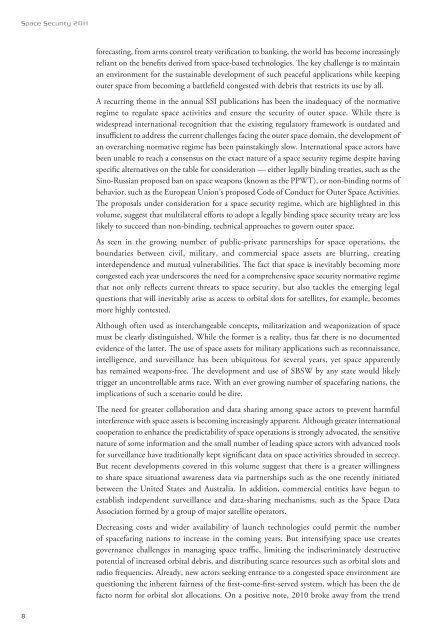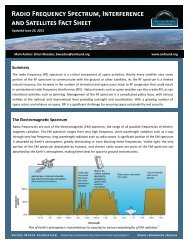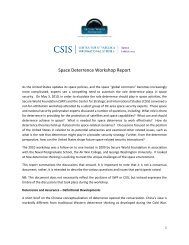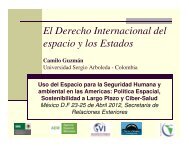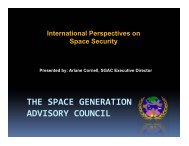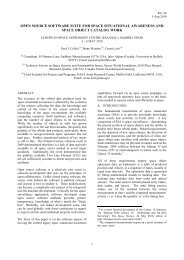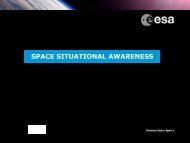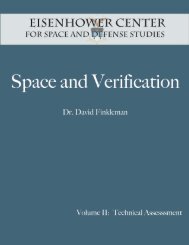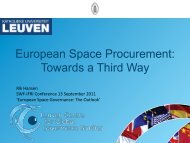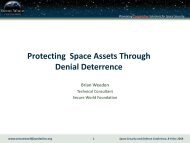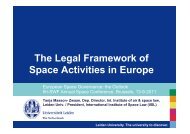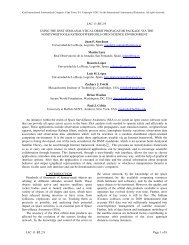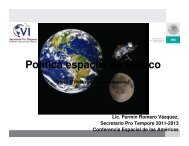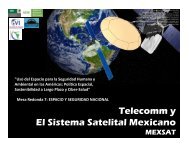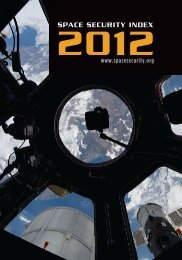Space Security Index
Space Security Index
Space Security Index
Create successful ePaper yourself
Turn your PDF publications into a flip-book with our unique Google optimized e-Paper software.
<strong>Space</strong> <strong>Security</strong> 2011<br />
8<br />
forecasting, from arms control treaty verication to banking, the world has become increasingly<br />
reliant on the benets derived from space-based technologies. e key challenge is to maintain<br />
an environment for the sustainable development of such peaceful applications while keeping<br />
outer space from becoming a battleeld congested with debris that restricts its use by all.<br />
A recurring theme in the annual SSI publications has been the inadequacy of the normative<br />
regime to regulate space activities and ensure the security of outer space. While there is<br />
widespread international recognition that the existing regulatory framework is outdated and<br />
insucient to address the current challenges facing the outer space domain, the development of<br />
an overarching normative regime has been painstakingly slow. International space actors have<br />
been unable to reach a consensus on the exact nature of a space security regime despite having<br />
specic alternatives on the table for consideration — either legally binding treaties, such as the<br />
Sino-Russian proposed ban on space weapons (known as the PPWT), or non-binding norms of<br />
behavior, such as the European Union’s proposed Code of Conduct for Outer <strong>Space</strong> Activities.<br />
e proposals under consideration for a space security regime, which are highlighted in this<br />
volume, suggest that multilateral eorts to adopt a legally binding space security treaty are less<br />
likely to succeed than non-binding, technical approaches to govern outer space.<br />
As seen in the growing number of public-private partnerships for space operations, the<br />
boundaries between civil, military, and commercial space assets are blurring, creating<br />
interdependence and mutual vulnerabilities. e fact that space is inevitably becoming more<br />
congested each year underscores the need for a comprehensive space security normative regime<br />
that not only reects current threats to space security, but also tackles the emerging legal<br />
questions that will inevitably arise as access to orbital slots for satellites, for example, becomes<br />
more highly contested.<br />
Although often used as interchangeable concepts, militarization and weaponization of space<br />
must be clearly distinguished. While the former is a reality, thus far there is no documented<br />
evidence of the latter. e use of space assets for military applications such as reconnaissance,<br />
intelligence, and surveillance has been ubiquitous for several years, yet space apparently<br />
has remained weapons-free. e development and use of SBSW by any state would likely<br />
trigger an uncontrollable arms race. With an ever growing number of spacefaring nations, the<br />
implications of such a scenario could be dire.<br />
e need for greater collaboration and data sharing among space actors to prevent harmful<br />
interference with space assets is becoming increasingly apparent. Although greater international<br />
cooperation to enhance the predictability of space operations is strongly advocated, the sensitive<br />
nature of some information and the small number of leading space actors with advanced tools<br />
for surveillance have traditionally kept signicant data on space activities shrouded in secrecy.<br />
But recent developments covered in this volume suggest that there is a greater willingness<br />
to share space situational awareness data via partnerships such as the one recently initiated<br />
between the United States and Australia. In addition, commercial entities have begun to<br />
establish independent surveillance and data-sharing mechanisms, such as the <strong>Space</strong> Data<br />
Association formed by a group of major satellite operators.<br />
Decreasing costs and wider availability of launch technologies could permit the number<br />
of spacefaring nations to increase in the coming years. But intensifying space use creates<br />
governance challenges in managing space trac, limiting the indiscriminately destructive<br />
potential of increased orbital debris, and distributing scarce resources such as orbital slots and<br />
radio frequencies. Already, new actors seeking entrance to a congested space environment are<br />
questioning the inherent fairness of the rst-come-rst-served system, which has been the de<br />
facto norm for orbital slot allocations. On a positive note, 2010 broke away from the trend


